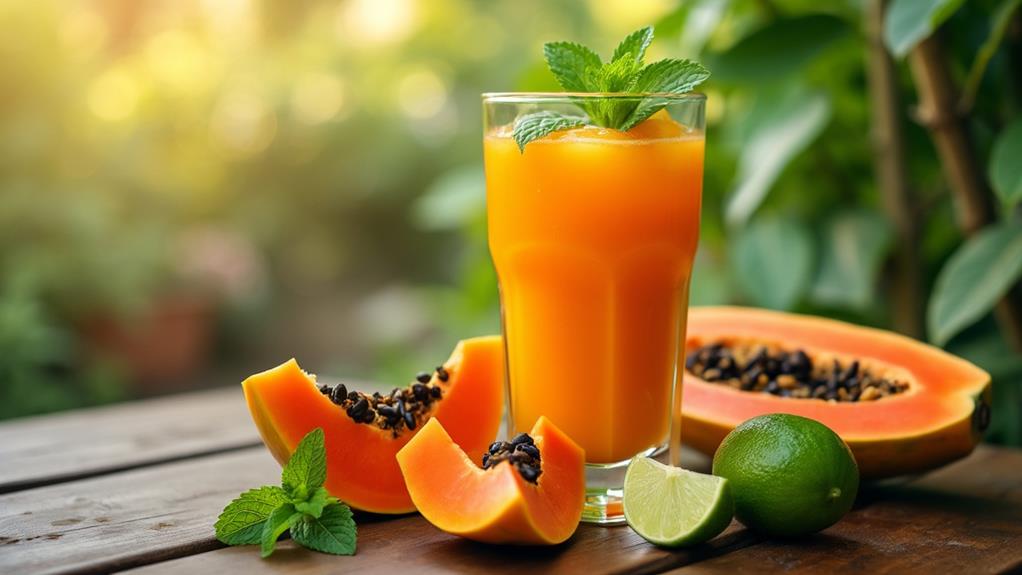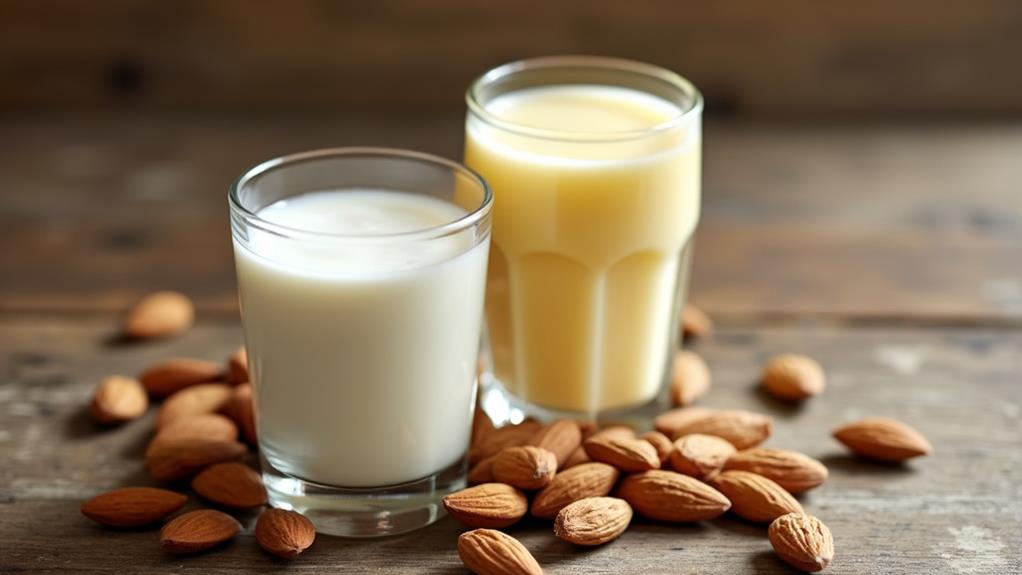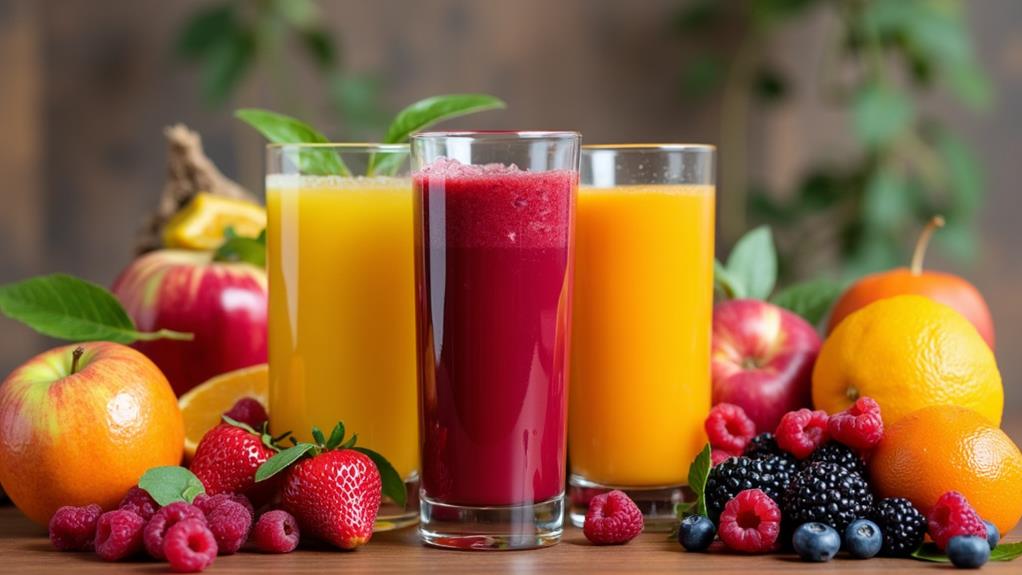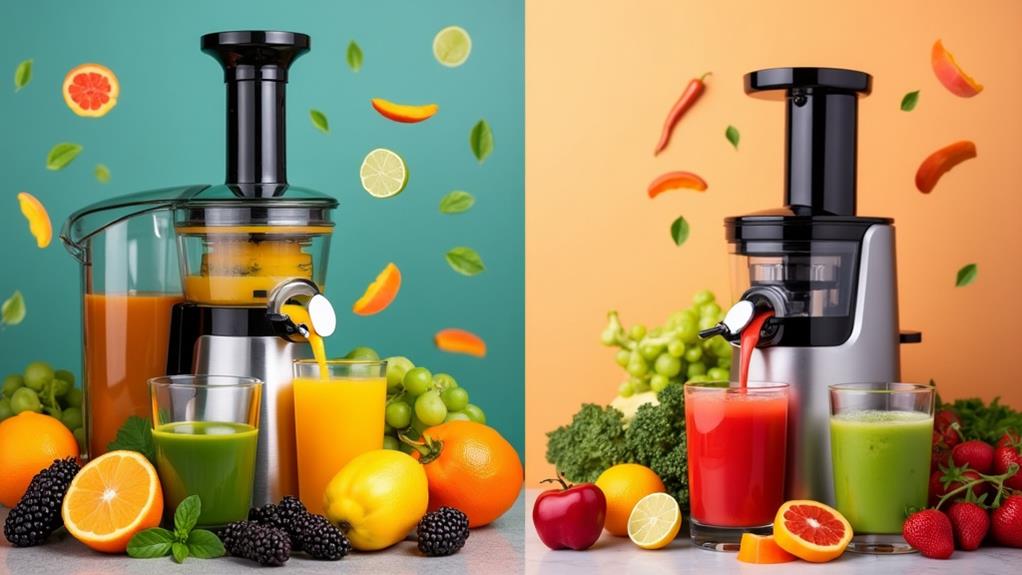Winter Squash Juice: Sweet, Nutty, and Packed With Vitamin a
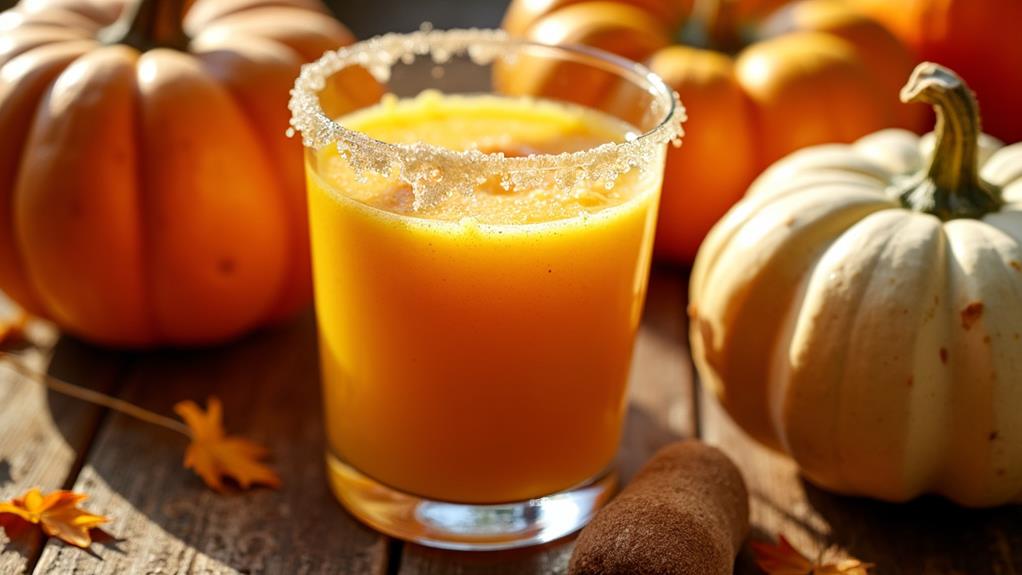
Winter squash juice offers a delightful mix of sweet and nutty flavors, perfect for a revitalizing treat. Packed with vitamin A, it supports your vision and skin health while providing antioxidants like vitamin C and beta-carotene. It's low in calories, making it a great option for weight management, and the potassium content aids heart health. Preparation is simple: blend peeled, chopped squash with water, and strain for a smooth drink. Improve it with spices like cinnamon for extra warmth. Savor the distinct taste and health benefits of this lively orange juice, and uncover how it can enrich your diet.
Nutritional Benefits
Winter squash juice, particularly from butternut squash, is often celebrated for its impressive nutritional profile. When you sip on this juice, you're indulging in a beverage that's brimming with health benefits. It's a powerhouse of vital nutrients, starting with a generous serving of vitamin A, important for maintaining healthy vision and immune function. With each cup, you get a substantial amount of dietary fiber, about 7 grams, which supports digestive health and helps you feel full and satisfied for longer periods.
This juice is also low in calories, containing just about 83 calories per cup, making it a smart choice if you're watching your weight. Butternut squash juice doesn't just stop at vitamin A and fiber. It's packed with antioxidants, including vitamin C, which is known for enhancing your immune system and promoting skin health. These antioxidants, like beta-carotene and vitamins C and E, play a significant role in protecting your cells from damage and reducing inflammation in your body. By incorporating winter squash juice into your diet, you're not only treating your taste buds but also nurturing your complete well-being.
Vitamin A Richness
A remarkable feature of butternut squash juice is its exceptional richness in vitamin A. Just one cup provides over 450% of the Recommended Daily Intake (RDI), making it a powerhouse of nutrients. The lively orange hue of butternut squash juice isn't just eye-catching; it signals its high vitamin A content. This vitamin primarily comes from beta-carotene, an antioxidant that your body converts into active vitamin A.
Vitamin A is essential for maintaining eye health. By consuming butternut squash juice, you're giving your eyes a lift. It helps protect against age-related macular degeneration, a common eye condition that can affect your vision as you grow older. Butternut squash juice doesn't just stop at supporting eye health. It also plays a significant role in skin health. Vitamin A promotes cell turnover and helps retain moisture, so sipping on this juice can contribute to a smooth, healthy complexion.
Incorporating butternut squash juice into your diet means you're not only enjoying its delightful taste but also reaping the benefits of its nutrient density. This juice is a simple, effective way to improve your eye health and general well-being.
Sweet and Nutty Flavor
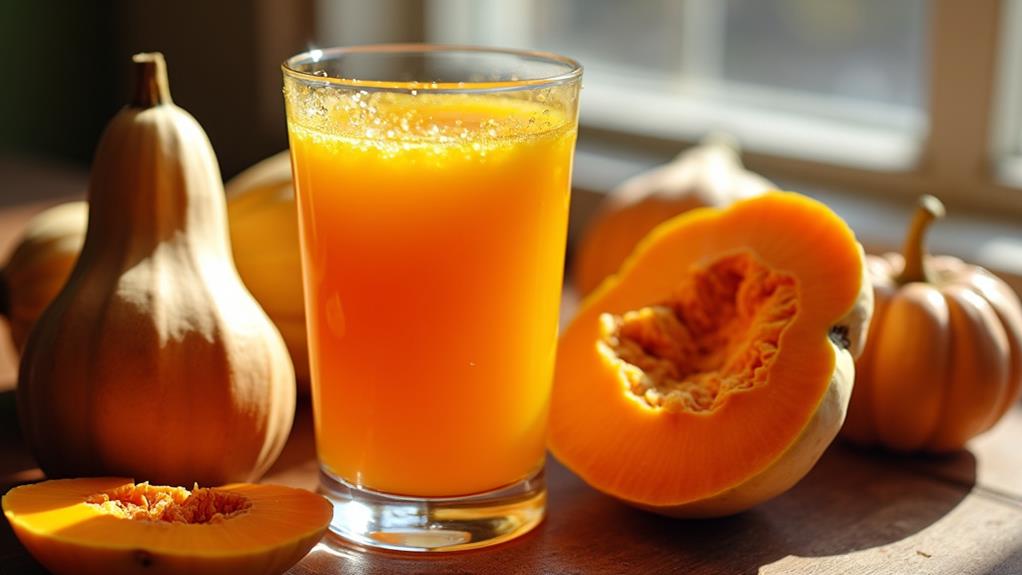
Have you ever tasted a juice that perfectly balances sweetness and nuttiness? Winter squash juice, especially from butternut squash, offers just that delightful blend. Its naturally sweet flavor stems from high natural sugar content, complemented by a nutty, earthy undertone. This unique flavor profile makes it a versatile choice for both sweet and savory recipes. Imagine sipping on a drink where the sweet and nutty notes dance on your taste buds, leaving you wanting more.
The lively orange color you see in winter squash juice is not just for show—it's a hint of the beta-carotene richness inside. This nutrient not only amplifies the sweet flavor but also brings substantial health benefits. Beta-carotene is known for improving eye health, making this juice both a treat and a advantage for your body.
When you drink fresh winter squash juice, you experience the full spectrum of its sweet, nutty flavor and nutritional benefits. Here are some ideas to enjoy it:
- Mix with spices like cinnamon and nutmeg for added warmth.
- Use in smoothies to elevate flavor and nutrition.
- Enjoy as a standalone drink for a revitalizing experience.
Juice Preparation Tips
Getting started with making winter squash juice is simpler than you might think. To begin, choose a ripe butternut squash. It's loaded with over 450% of your recommended daily intake of vitamin A per cup, which is fantastic for health. This squash offers a naturally sweet and nutty flavor that makes for a delicious juice.
Begin your juice preparation by carefully peeling the squash. You can use a knife or peeler, but if the skin feels tough, microwave the squash for 1-2 minutes to soften it. Once peeled, cut the squash in half and scoop out the seeds. Don't toss those seeds—they can be roasted for a healthy snack! Next, chop the flesh into smaller pieces suitable for your blender.
Blend the chopped squash with water until smooth. Then, it's time to strain the mixture. Use a fine mesh sieve or cheesecloth to separate the juice from the pulp, leaving you with a smooth, flavorful drink. For an extra burst of flavor, try adding spices like cinnamon. It complements the squash's sweetness perfectly, enhancing your juice's taste while keeping it healthy and invigorating.
Health Advantages
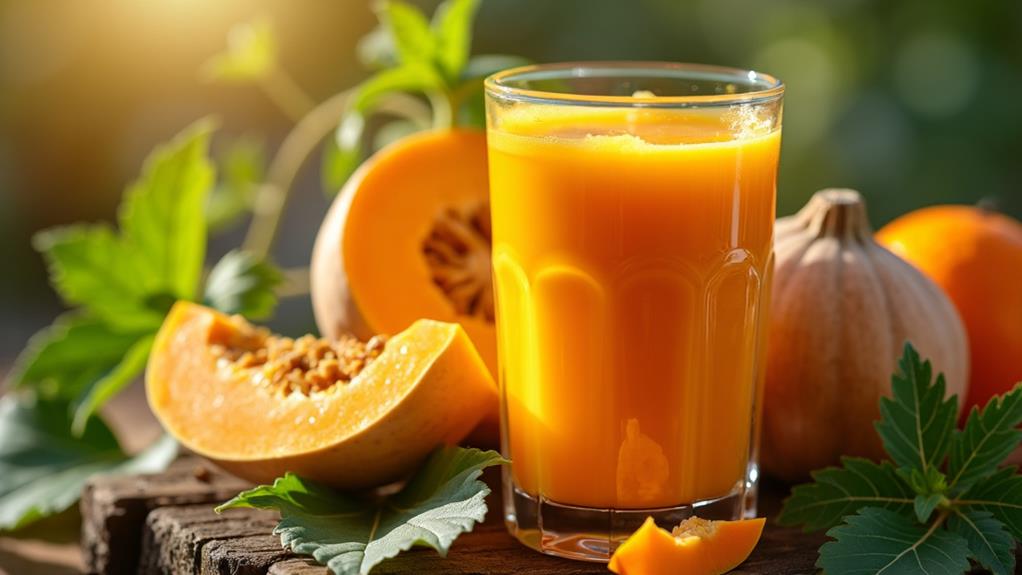
Winter squash juice is a powerhouse of nutrients that can greatly improve your health. Rich in vitamin A, just one cup of butternut squash juice provides over 450% of your recommended daily intake. This high concentration supports eye health and strengthens your immune system, keeping you lively and energetic. Furthermore, the juice is loaded with vitamin C, offering more than 50% of your daily needs. This vitamin is essential for collagen production and further fortifies your immunity, making it a perfect supplement to your diet, especially during flu season.
Here are some key health advantages of winter squash juice:
- Strengthens Immunity: High in vitamin A and vitamin C, it reinforces your body's defenses.
- Supports Heart Health: With more potassium than bananas, it helps regulate blood pressure.
- Reduces Inflammation: Antioxidants like beta-carotene, vitamin C, and vitamin E protect against cellular damage.
In addition, the fiber-rich nature of winter squash juice aids digestion and promotes feelings of fullness, assisting in weight management. By incorporating this nutrient-dense juice into your routine, you're not just enjoying a delicious beverage but also investing in your long-term health.
Culinary Uses
A versatile ingredient in the kitchen, winter squash juice offers a delightful way to improve both sweet and savory dishes. When you're working with butternut squash juice, you can blend it with spices like cinnamon and nutmeg, enhancing its natural sweetness and nutty flavor. This combination makes your smoothies and beverages not only delicious but also packed with crucial vitamins A and C. Imagine starting your day with a revitalizing drink that pairs well with other fruits like apples and oranges, creating a nutrient-dense beverage rich in antioxidants.
In culinary applications, winter squash juice shines as a base for soups and sauces. Its creamy texture and rich flavor raise your dishes, while its high vitamin A and fiber levels enhance their nutritional content. For baked goods like muffins and pancakes, consider using roasted butternut squash juice. It adds moisture and nutritional benefits without overpowering the dish's flavor. You can even use it as a natural sweetener in desserts, reducing the need for added sugars while keeping your creations flavorful and healthy.
Winter squash juice beautifully bridges the gap between vegetables and fruits, offering endless possibilities in your culinary adventures.
Seasonal Availability
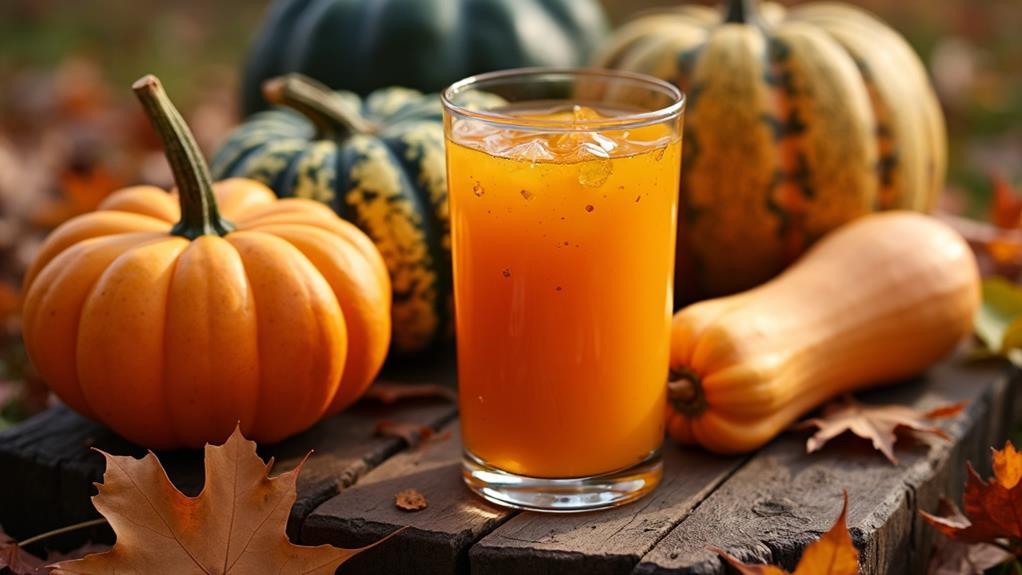
When you're planning your culinary creations, understanding the seasonal availability of winter squash, like butternut squash, can make a big difference. Knowing when butternut squash is in peak season helps you utilize its rich flavor and nutritional benefits, including its high vitamin A content. Typically harvested from late summer to fall, this winter squash is most plentiful in markets from September through February. This span gives you ample opportunity to enjoy fresh butternut squash juice, perfect for enhancing your vitamin intake during the cooler months.
While its hard outer shell allows for storage beyond harvest time, the freshest specimens are firm, heavy, and have smooth, tan skin. Keep an eye out for these qualities when selecting butternut squash to verify you're getting the best produce available. However, keep in mind that seasonal availability can vary by location. Some regions grow butternut squash year-round in controlled environments, so check your local market.
- Peak season: September through February
- Quality indicators: Firm, heavy, smooth tan skin
- Geographical variance: Some places offer year-round availability
Embrace the seasonality of winter squash to enjoy its sweet, nutty flavor and health benefits at their peak.
Storage Suggestions
Proper storage of winter squash can greatly extend its shelf life and keep it ready for your next recipe. Implementing a few simple storage suggestions can make all the difference. Initially, store your butternut squash and other varieties in a cool, dry place to optimize their longevity. Avoid damp areas since moisture can lead to the spoilage of the squash's hard outer shell, ultimately causing rot. Whole butternut squash can sit comfortably at room temperature for several months if the conditions are just right.
When you've cut into the squash, though, proper storage becomes essential. Refrigerate any cut pieces of squash, and plan to use them within a week to maintain freshness, similar to how you handle other fresh vegetables. If you've cooked your butternut squash and want to save it for later, freezing is a fantastic option. This not only preserves the squash but also offers you the convenience of having prepped ingredients on hand for future meals.
Before cutting your squash, always wash it thoroughly. This step helps remove dirt and potential contaminants, ensuring that the squash remains as fresh and safe as possible for consumption.
Popular Winter Squashes
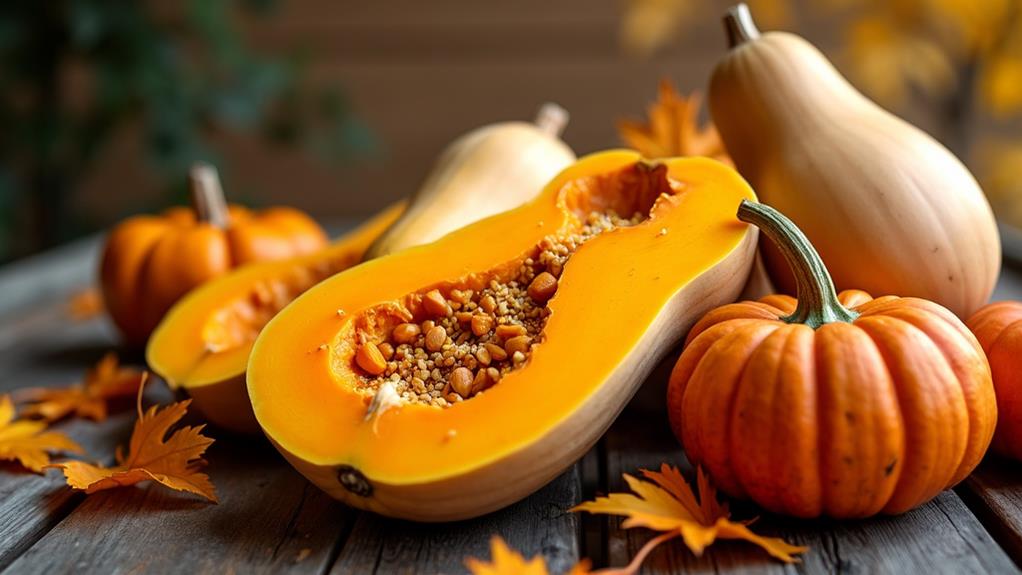
With your winter squash stored properly, you can now explore the delightful variety each type brings to your kitchen. Popular winter squashes like butternut, acorn, spaghetti, delicata, and Hubbard each have their unique appeal. Butternut squash, known for its sweet flavor and smooth texture, is a versatile vegetable perfect for both sweet and savory dishes. It's packed with vitamins and provides a rich source of nutrients while keeping calories in check.
Acorn squash, with its distinctive shape and mild sweetness, is ideal for roasting and makes an excellent candidate for stuffing. Its charm lies in its ability to transform simple ingredients into a hearty meal, all while being a low-calorie option. Spaghetti squash, on the other hand, separates into strands when cooked, offering a delightful low-carb alternative to pasta without sacrificing on flavor.
Here are some highlights to reflect on when choosing your winter squash:
- Butternut: Sweet, smooth, versatile for sweet and savory.
- Acorn: Distinctive shape, mild sweetness, perfect for roasting.
- Spaghetti: Low-carb pasta alternative, separates into strands.
Exploring these varieties will enrich your culinary adventures with vegetables, adding both flavor and nutrition to your meals.
Recipe Inspirations
Engage yourself in the world of recipe inspirations with the delightful potential of winter squash juice. Start by blending roasted butternut squash, known for its natural sweetness and nutty flavor, into a rich, satisfying juice. This versatile base opens up a myriad of possibilities for both sweet and savory creations. To improve its inherent sweetness, consider adding warming spices like cinnamon and nutmeg. These spices draw out the squash's flavors, creating a fall-inspired drink that's perfect for cozy evenings.
Butternut squash juice isn't just delicious; it's also a powerhouse of nutrients, boasting over 450% of your daily vitamin A needs per cup. This makes it an excellent choice for enhancing eye health and supporting immune function.
For a revitalizing twist, mix your squash juice with citrus fruits like mandarin orange. The citrus adds a bright acidity that complements the sweetness of the squash. To introduce a savory element, incorporate toasted almonds or walnuts. These nuts not only uplift the flavor but also provide healthy fats and protein, creating a well-rounded beverage that showcases the harmony of fruits and vegetables. Enjoy experimenting with these combinations, and uncover your own unique blend.

